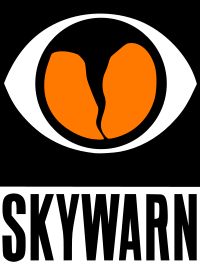SKYWARN was developed by the NWS to improve the accuracy and timeliness of severe weather warnings. SKYWARN spotters are volunteers who report severe weather to their local NWS office. Although not all spotters are ham radio operators, many of them are. They provide real-time, ground-level observations of severe weather conditions, such as hail, high winds, tornadoes, and flooding. This information is then used by the NWS to issue more accurate and timely warnings, ultimately saving lives and reducing property damage.
The Rusk County ARC often partners with the Rusk County Office of Emergency Management to host in-person SKYWARN training in Henderson. Another way to become a SKYWARN spotter is through online training which covers the basics of storm spotting, including identifying severe weather,
reporting techniques, and safety procedures. The online course is self-paced, allowing amateur radio operators to complete the training on their own schedule. The course is also free of charge, making it accessible to anyone interested in becoming a SKYWARN spotter.In addition to the online courses, the NWS sometimes offers webinars and training sessions throughout the year. These sessions provide hands-on training and allow amateur radio operators to ask questions and receive feedback from experienced SKYWARN spotters. Participating in these training sessions is an excellent way to network with other SKYWARN spotters and stay up-to-date with the latest severe weather forecasting and reporting techniques.
To become a SKYWARN spotter, amateur radio operators can visit the NWS website and sign up for the online courses or attend a local training session. Once trained, spotters can report severe weather conditions using a variety of methods, including phone, email, or through a SKYWARN net on their local amateur radio repeater. By becoming a SKYWARN spotter, amateur radio operators can help keep their communities safe during severe weather events and play a critical role in protecting lives and property.

